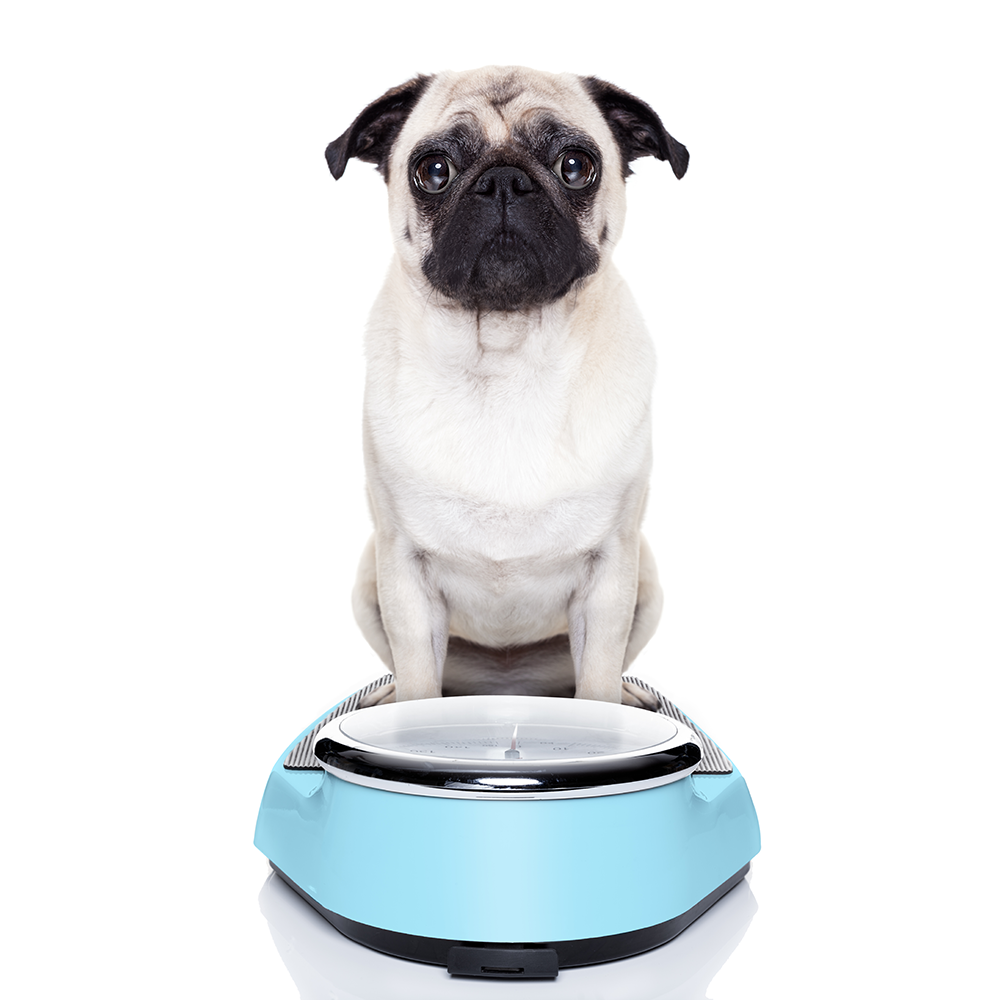
There is one simple truth. Your dog is overweight because he is consuming more calories than he burns. Yes, more exercise will help, but it will seldom solve the overweight issue. You need to reduce the amount of food you are feeding your dog.
Our recommendation is to feed once in the morning and once in the evening at the same time every day. Your dog will be at his happiest when he has a set routine. The best way for your dog to lose weight is to do it slowly. Get an accurate weight of your dog. If you can’t do it at home, visit your veterinarian's office. Most vet scales are in the waiting room so you shouldn't need to schedule an appointment. You will also need a notebook to keep a daily log so you can review your dog’s progress.
Keep in mind the amount of food in our example below is not meant to represent what every 80 lb dog may require. You'll want to make adjustments based on the needs and activity of your dog. The important point is to gradually reduce the amount of food you feed until your dog has reached his target weight.
Let’s assume that Fido is 80 lbs today, but he should weigh 58 lbs. He is currently receiving two level cups (standard 8 oz measuring cup from your kitchen) of food in the morning and two level cups in the evening. We already know this is too much food because Fido is fat. Your vet has mentioned it a few times during office visits. Start feeding him 1¾ cups of food twice a day and weigh him again in two weeks. If he has lost weight, continue to feed the same amount of food and weigh again in 2 weeks. If he is continuing to lose weight, maintain the same level of food. If he stops losing weight and is still more than 58 lbs, cut the food to 1½ cups twice a day and reweigh in two weeks. Continue with the current feeding routine and monitor his weight every two weeks. If he stops losing weight again and he is still above 58 lbs then cut his food to 1¼ cups twice a day. Make gradual changes, take your time and be consistent.
You do not want Fido to lose weight too fast or he will be begging constantly and your resolve may weaken. The proper amount of weight loss for Fido is no more than 2.5% (2lbs for an 80 lb dog,1.75lbs when he is down to 70 lbs) every 2 weeks. We prefer to keep it closer to 1% (one half to 1 lb) every 2 weeks. By allowing your dog to lose weight slowly, you will give his body, metabolism and mindset time to properly adjust. Once your dog has reached his target weight, maintain the level of food that got him there. You can adjust the amount you are feeding up or down based on your dog's activity level. If, for normal activity, he is receiving 1 level cup twice a day, adjust your amount on a super active day by giving him a rounded cup in the evening. If he was a couch potato, then give him slightly less than a level cup in the evening. The morning feeding should always remain the same.
Because Young Again is made with highly digestible animal protein and fewer starch/carbs than most dog foods, it makes losing weight easier for your dog. Our food contains 40% protein and less than 25% digestible carbs. Protein digests much more slowly than starch/carbs, so your dog will feel full longer. Eat a big bowl of raisin bran cereal (230 calories/cup, with milk) for breakfast and you'll probably be ravenously hungry before noon. Try eating an extra-large egg (80 calories) and your hunger pangs should be held off longer, yet the egg you ate has 65% fewer calories. Why does the egg keep you full longer than the cereal? Starch/carbs digest more quickly than protein and trigger much higher hunger feelings than do proteins and fats.
We recommend never giving table scraps, they are usually heavy in calories and make it difficult to maintain proper weight. The more people in the house feeding scraps, the bigger the problem trying to manage your dog's weight. High protein treats are best because they digest slowly and are less likely to add pounds to your dog. While the dog is losing weight, it's preferable that you give no treats or scraps; only their two regular feedings a day. Treats are cruel for a dieting dog as they get the digestive process revved up in the middle of the day instead of waiting to receive a full meal that is worth digesting. Once you rev up their digestive tract then they will continually beg for more food to satisfy the digestive tract demands. If your dog thinks he needs to eat then tell him no and distract him with playtime or a walk. Persistence for a few weeks will reward you with a more content dog that has developed healthier habits. Remember it is their job to make you feel guilty and it is your job to stay strong so your dog will live a longer and healthier life.